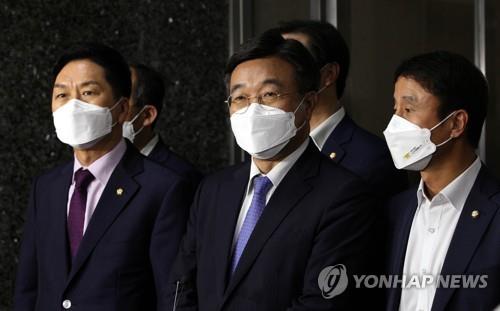- California Assembly OKs highest minimum wage in nation
- S. Korea unveils first graphic cigarette warnings
- US joins with South Korea, Japan in bid to deter North Korea
- LPGA golfer Chun In-gee finally back in action
- S. Korea won’t be top seed in final World Cup qualification round
- US men’s soccer misses 2nd straight Olympics
- US back on track in qualifying with 4-0 win over Guatemala
- High-intensity workout injuries spawn cottage industry
- CDC expands range of Zika mosquitoes into parts of Northeast
- Who knew? ‘The Walking Dead’ is helping families connect
DP steps back on contentious media bill, agrees to form bipartisan committee for further review
The ruling Democratic Party (DP) on Wednesday backtracked on its plan to pass a controversial media bill, criticized for potentially compromising press freedom, and agreed with the main opposition to form a special committee to further review the issue, party officials said.
“(The parties) agreed to establish a special committee to discuss reform measures covering the overall media industry,” Rep. Yun Ho-jung, floor leader of the DP, said after a meeting with his counterpart from the main opposition People Power Party (PPP).
The so-called media system improvement committee, to consist of 18 members from the rival parties, will run till Dec. 31 to review the media arbitration bill in question as well as other media related laws, including those governing newspaper and broadcasting companies.
The latest decision indicates the DP is stepping back from its unilateral push for its proposed revision to the media arbitration act, which has come under relentless criticism from the opposition bloc and local and global media-related entities for the bill’s potential to undermine the freedom of the media and silence critical news outlets.
The DP proposed the bill, centering on heightening the punitive damages against fake news by up to fivefold, as part of its media reform vision and initially planned to advance it through a plenary vote late last month.
In the face of growing criticism, however, the party agreed to put the bill to a one-month bipartisan review, with an eye to put it to a plenary vote by the deadline on Monday.
The floor leaders of the rival parties had met several times in last-minute talks earlier this week to negotiate a compromise alternative to the contested bill but failed to produce an outcome.
Controlling 169 seats of the unicameral 300-member parliament, the DP technically has the power to push the bill through a plenary session on its own.
The party, however, apparently fought shy of such a unilateral action out of fears it could stir up fierce opposition and public backlash.
Pundits said given the sensitivity of the lead-up to the 2022 presidential election in March, it would be difficult for the DP to process the bill sometime this year.
Asked whether the latest decision means the party is no longer pushing for the contentious punitive damages against disinformation, Yun said, “The basic stance remains unchanged.” “(The party) has not given that up, but it will take in various opinions to discuss it,” he added.

This photo provided by the National Assembly press corps shows Reps. Kim Gi-hyeon (from L) and Yun Ho-jung, floor leaders of the People Power Party and Democratic Party, respectively, speaking to reporters after their decision on a controversial media bill on Sept. 29, 2021. (Yonhap)












